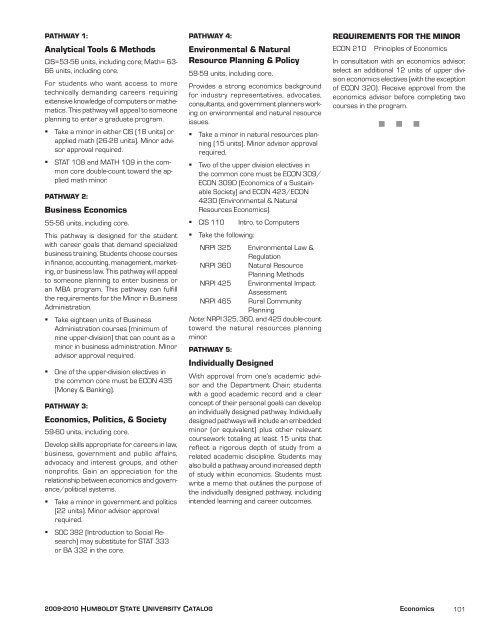2009-10 Academic Year (12MB) - Bad Request - Humboldt State ...
2009-10 Academic Year (12MB) - Bad Request - Humboldt State ...
2009-10 Academic Year (12MB) - Bad Request - Humboldt State ...
Create successful ePaper yourself
Turn your PDF publications into a flip-book with our unique Google optimized e-Paper software.
PATHWAY 1:<br />
Analytical Tools & Methods<br />
CIS=53-56 units, including core; Math= 63-<br />
66 units, including core.<br />
For students who want access to more<br />
technically demanding careers requiring<br />
extensive knowledge of computers or mathematics.<br />
This pathway will appeal to someone<br />
planning to enter a graduate program.<br />
Take a minor in either CIS (18 units) or<br />
applied math (26-28 units). Minor advisor<br />
approval required.<br />
STAT <strong>10</strong>8 and MATH <strong>10</strong>9 in the common<br />
core double-count toward the applied<br />
math minor.<br />
PATHWAY 2:<br />
Business Economics<br />
55-56 units, including core.<br />
This pathway is designed for the student<br />
with career goals that demand specialized<br />
business training. Students choose courses<br />
in finance, accounting, management, marketing,<br />
or business law. This pathway will appeal<br />
to someone planning to enter business or<br />
an MBA program. This pathway can fulfill<br />
the requirements for the Minor in Business<br />
Administration.<br />
Take eighteen units of Business<br />
Administration courses (minimum of<br />
nine upper-division) that can count as a<br />
minor in business administration. Minor<br />
advisor approval required.<br />
One of the upper-division electives in<br />
the common core must be ECON 435<br />
(Money & Banking).<br />
PATHWAY 3:<br />
Economics, Politics, & Society<br />
59-60 units, including core.<br />
Develop skills appropriate for careers in law,<br />
business, government and public affairs,<br />
advocacy and interest groups, and other<br />
nonprofits. Gain an appreciation for the<br />
relationship between economics and governance/political<br />
systems.<br />
Take a minor in government and politics<br />
(22 units). Minor advisor approval<br />
required.<br />
SOC 382 (Introduction to Social Research)<br />
may substitute for STAT 333<br />
or BA 332 in the core.<br />
<strong>2009</strong>-20<strong>10</strong> <strong>Humboldt</strong> <strong>State</strong> University Catalog<br />
PATHWAY 4:<br />
Environmental & Natural<br />
Resource Planning & Policy<br />
58-59 units, including core.<br />
Provides a strong economics background<br />
for industry representatives, advocates,<br />
consultants, and government planners working<br />
on environmental and natural resource<br />
issues.<br />
Take a minor in natural resources planning<br />
(15 units). Minor advisor approval<br />
required.<br />
Two of the upper division electives in<br />
the common core must be ECON 309/<br />
ECON 309D (Economics of a Sustainable<br />
Society) and ECON 423/ECON<br />
423D (Environmental & Natural<br />
Resources Economics).<br />
CIS 1<strong>10</strong> Intro. to Computers<br />
Take the following:<br />
NRPI 325 Environmental Law &<br />
Regulation<br />
NRPI 360 Natural Resource<br />
Planning Methods<br />
NRPI 425 Environmental Impact<br />
Assessment<br />
NRPI 465 Rural Community<br />
Planning<br />
Note: NRPI 325, 360, and 425 double-count<br />
toward the natural resources planning<br />
minor.<br />
PATHWAY 5:<br />
Individually Designed<br />
With approval from one’s academic advisor<br />
and the Department Chair, students<br />
with a good academic record and a clear<br />
concept of their personal goals can develop<br />
an individually designed pathway. Individually<br />
designed pathways will include an embedded<br />
minor (or equivalent) plus other relevant<br />
coursework totaling at least 15 units that<br />
reflect a rigorous depth of study from a<br />
related academic discipline. Students may<br />
also build a pathway around increased depth<br />
of study within economics. Students must<br />
write a memo that outlines the purpose of<br />
the individually designed pathway, including<br />
intended learning and career outcomes.<br />
REQUIREMENTS FOR THE MINOR<br />
ECON 2<strong>10</strong> Principles of Economics<br />
In consultation with an economics advisor,<br />
select an additional 12 units of upper division<br />
economics electives (with the exception<br />
of ECON 320). Receive approval from the<br />
economics advisor before completing two<br />
courses in the program.<br />
� � �<br />
Economics<br />
<strong>10</strong>1

















